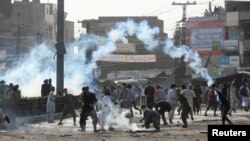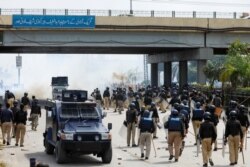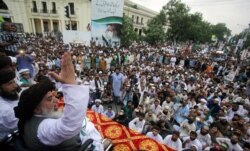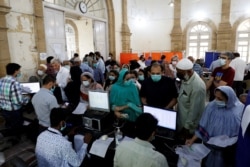Activists who are members of an Islamist party in Pakistan clashed with police and refused to unblock highways across many parts of the country for a second day Tuesday to protest the arrest of their leader.
Pakistani officials and witnesses have reported that attempts to disperse stick-wielding protesters in some areas triggered violent clashes that killed at least four people, including a policeman, and wounded scores of others.
More than 60 law enforcement personnel also were among those injured. Video showed wounded policemen, with some surrounded by protesters, and official and public vehicles damaged or set on fire.
Members of the radical Tehrik-i-Labaik Pakistan, or TLP, took to the streets in major cities Monday shortly after authorities in the eastern city of Lahore detained their leader, Saad Rizvi.
Officials and travelers said the ensuing blockades of major roads that are entry and exit routes to cities have caused hours of traffic jams, paralyzed businesses and disrupted routine life in Pakistan.
TLP activists also have blocked some of the key roads into the national capital, Islamabad.
Rizvi’s arrest was apparently meant to deter his group from organizing rallies demanding the expulsion of France’s ambassador over the reprinting of cartoons in a French magazine depicting the Prophet Muhammad, an act condemned as blasphemous.
The violence disrupted critical oxygen supplies for COVID-19 patients in the country’s most populous province of Punjab, of which Lahore is the capital, said Yasmin Rashid, the provincial health minister.
Pakistan is currently struggling to contain what officials say is a third wave of the pandemic. Officials reported Tuesday that at least 4,000 coronavirus patients were undergoing treatment in intensive care units in hospitals.
Last week, Rizvi urged Prime Minister Imran Khan’s government in a statement to abide by a deal Rizvi claimed was recently struck with his group to expel the French envoy by April 20.
Government officials, however, maintain they only pledged to place and debate the issue in parliament.
Khan chaired a cabinet meeting Tuesday, where he approved the deployment of the paramilitary rangers force in different cities to assist police in maintaining law and order.
Federal Minister Fawad Hussain Chaudhry told a post-meeting news conference in Islamabad the government was trying to resolve the crisis peacefully and promised the situation would soon be brought under control.
“It is the state of Pakistan that has to make such decision. No group or party has the authority to dictate its decisions to the state of Pakistan,” Chaudhry said when asked whether the government had given assurances to TLP that the French envoy would be asked to leave the country.
TLP activists nearly besieged Islamabad late last year over the issue and ended the protest only after the government signed the alleged deal with the group.
The religious group has risen to prominence in Pakistan in recent years and has held major demonstrations to pressure the government against repealing or reforming the country’s harsh blasphemy laws, which critics say often are used to intimidate religious minorities and settle personal disputes.
Critics and Pakistanis in posts on social media demanded the government strictly deal with the protesters to discourage them from threatening the state and undermining public life in the future.
“When you appease them, they will just push back harder. This has long been the Pakistani state’s predicament with the TLP and its ilk. And this is no longer just a domestic matter; the TLP’s current demands relate to the French ambassador,” tweeted Michael Kugelman, deputy director of the Asia program at Washington’s Wilson Center.










